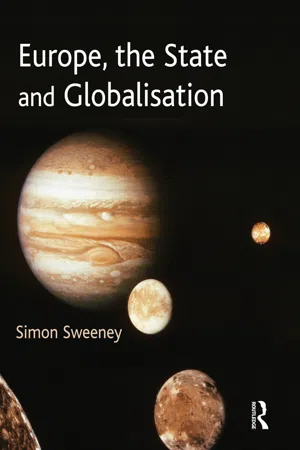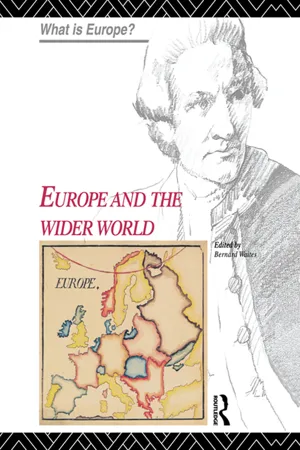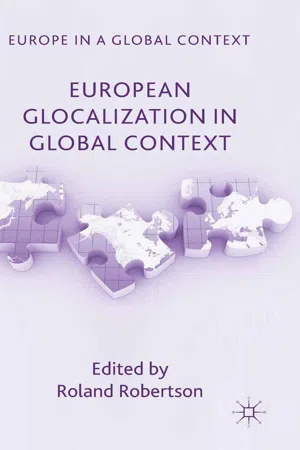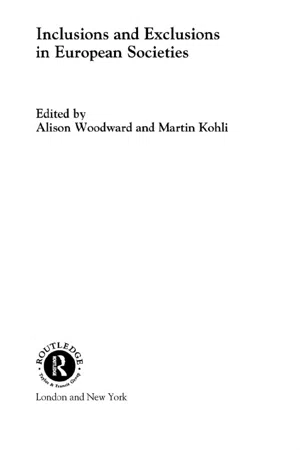History
Globalization in Europe
Globalization in Europe refers to the increasing interconnectedness and integration of European countries with the rest of the world. This process has been shaped by factors such as trade, technology, migration, and cultural exchange. It has led to both opportunities and challenges, impacting various aspects of European societies, economies, and politics.
Written by Perlego with AI-assistance
Related key terms
8 Key excerpts on "Globalization in Europe"
- eBook - ePub
World History
An Introduction
- Eric Vanhaute(Author)
- 2013(Publication Date)
- Routledge(Publisher)
Pax Mongolica ensured strongly expanding trade on the silk routes from east to west. Caravans brought silk, cotton, pearls, jewellery and spices to the west, and silver, linen and horses to the east. People, ideas and techniques travelled over the Eurasian continent together with the goods. A maritime silk route also flourished from the Chinese Sea over the Indian Ocean to the Persian Gulf and the Red Sea. Indian cotton clothing, famous for its colours, quality and variation, was one of the most important commodities. The goods were shipped from flourishing trading cities on the Asian coasts, magnets for European merchants in later centuries.In its most essential form, globalization stands for the expansion of trade and interaction. Some people look for the roots of contemporary globalization early in world history, especially in the growth of Afro-Eurasian trade networks. Others look at European expansion via new, overseas trade routes as of the sixteenth century, which grafted on to flourishing commercial networks in the east. The number of trade ships from Europe to Asia increased from 770 in the sixteenth century to 6, 660 in the eighteenth century. ‘Global’ commodities such as slaves, silver, sugar, spices and fur galvanized the new expansive trade system.Present-day world history or global history is sometimes translated as the history of globalization. But what does globalization mean and how can it be studied?Figure 8.1 The popularity of the concepts civilization, modernization and globalization, 1950–2008.Note: An analysis of the use of the terms civilization, modernization and globalization in Google Books shows that the concept of civilization lost out to modernization as of the 1960s, and that mod- ernization partially became a victim of the success of the concept globalization in the 1990s. We also see that after quick growth, the concept globalization started to lose popularity around 2003–2004 (together with a small revival of the term civilization).The enormous popularity of the concept sometimes makes us forget that globaliza- tion is a neologism, popularized in the 1980s as a reference to the accelerated internationalization of the financial sector. In the 1990s, globalization became a buzzword, an umbrella term used to label the social transitions in the last quarter of the twentieth century. Globalization developed into a generalized container term that aimed to unite all the historical processes of increasing interaction and interconnection. This chapter further examines what we mean by globalization and, specifically, the historical scope of the concept. What does world history teach us about globalization, and is it a useful concept for denoting social changes? - eBook - ePub
The Practice of Global History
European Perspectives
- Matthias Middell(Author)
- 2019(Publication Date)
- Bloomsbury Academic(Publisher)
46Even though diversity is the first characteristic of the European landscape in global history due to national intellectual traditions and organizational trajectories, transnational cooperation and mutual inspiration have increasingly come to the fore. A variety of academic journals have emerged, and when looking at their authorship it becomes clear that they are not, on the whole, platforms for national discourse communities as the leading journals of the nineteenth and twentieth centuries were.47 Although they are edited from a certain national background, they are intended to facilitate transnational communication while working simultaneously as mediums to different audiences and linguistic communities. Itinerario, edited in the Netherlands since 1977, continues the Dutch tradition of interest in early modern colonialism and transregional encounter, and since the early 2000s has opened up widely to global interactions from the fifteenth century to the present.48 Comparativ, founded in Leipzig in 1991, publishes four to six thematic issues a year, providing collections of articles that look at different world regions, mobilizing the expertise of area studies for collaboratively produced global or transregional histories.49 While the multilingual journal bridges gaps between germanophone, anglophone and francophone readerships, another German periodical, Zeitschrift für Weltgeschichte, was founded in 2000 in Hannover by a specialist in Russian history, Hans-Heinrich Nolte, which collects articles mainly in German and English.50 It was followed in 2006 by the Journal of Global History,51 initiated by the influential group in global economic history at the London School of Economics including Patrick O’Brien and Gareth Austin,52 which was also an expression of the ongoing institutionalization of global history in the UK as the examples of the Global History and Culture Centre at the University of Warwick53 and the Centre for Global History at the University of Oxford54 demonstrate. The more recent conjuncture of global history in France is reflected in the establishment in 2012 of the journal Monde(s) by a new generation of French historians who connect national, imperial and global history in an innovative way.55 - eBook - ePub
- Diego Olstein(Author)
- 2014(Publication Date)
- Palgrave Macmillan(Publisher)
The second conceptual problem is that despite the tight and intricate relationship between the current processes of globalization and the writing of world and global history, there is not a clear analysis of the relationship between world and global history vis-à-vis the history of globalization. This second problem is closely related to the third one: the lack of a clear chronological and conceptual framework for the history of globalization. Although the usual fate of central concepts in history such as slavery, feudalism, capitalism, imperialism, or modernity is the existence of a wide range of definitions, chronologies, and different research paths, the situation with the concept of globalization goes well beyond that, as the disagreement on its coverage ranges from the past 30 to the last 200,000 years. This chapter presents the history of globalization and many of its chronological, conceptual, and methodological debates. Besides its own merits, the understanding of the debates on the history of globalization is key in the search for the subtle distinction between world and global history.The history of globalizationThe depiction of current globalization processes as the integration of an interdependent economy relying on information and communication networks that simultaneously contribute to enhancing a global culture may suite many historical accounts.5 The common feature of all of these works is the attempt to establish a point of departure for the phenomenon of globalization. The idiosyncratic feature of most of them is that any work provides its own starting point. The first part of this chapter arranges the approaches to the history of globalization into three main categories following the dating of globalization: the extremist, moderate, and conciliatory approaches. Nevertheless, the multiplicity of periodizations implies that several conceptual problems are at stake. The second part of this chapter, dedicated to the conceptual issues, examines the implicit debates underlying the search after l’idole de l’origine - eBook - ePub
- Simon Sweeney(Author)
- 2014(Publication Date)
- Routledge(Publisher)
Chapter 9Globalisation and the European Union in transition
Overview
- The meaning of globalisation
- Globalisation as process
- The EU response to globalisation
Key concepts
- 9.1 Globalisation
- 9.2 Power
Introduction
This chapter examines the concept of globalisation and assesses the EU response to the forces underlying the phenomenon. The term is relatively new; it does not even appear in my two-volume Shorter Oxford English Dictionary published in 1983. Now, entering the word globalisation into the Google search engine suggests 2,890,000 websites containing definitions of the word, and it has passed into everyday usage. A search with Amazon.com, a business readily identified with the modern phase of globalisation, reveals 3,877 titles on the subject. Despite, or perhaps because of its widespread use, there seems little agreement on what it actually means and none on whether it is a force for good, or bad.The lack of clarity is widespread, but sceptics who question the usefulness or accuracy of the term seek to distinguish between what is ‘internationalisation’ and what is ‘globalisation’. This chapter begins with an attempt to establish this difference, and therefore some understanding of what globalisation is, and continues with a necessarily selective examination of different writers’ assessments of what globalisation means.The second part of the chapter gives a brief history of key stages in the development of the International Political Economy, partly to illustrate that globalisation, as it is often understood, is not as new as is sometimes assumed. This is complicated by the scepticism expressed in the first part, because on the one hand one might argue that the entire concept of globalisation is a myth, therefore it cannot have any history. That is not the view taken here: there are aspects of globalisation, and claims made about globalisation, that have significant historical precedent. By outlining some of these we may better understand how the modern idea of globalisation has emerged. Looking at some history also highlights some of the weaknesses in the arguments presented by globalisation theorists and those who support the project of globalisation. - eBook - ePub
- Bernard Waites(Author)
- 2005(Publication Date)
- Routledge(Publisher)
We have seen in the previous section that Europe is increasingly playing a key role in the operation of the global economy. It could develop this central role further if the moves towards economic and monetary union of the member states of the EC accelerate in the 1990s. But to analyse the nature and consequences of these developments requires a step back from the immediate empirical reality of European economic interactions. In this section we shall try to focus on the more general nature of the trends and movements within the world economic order. We shall attempt this here as a prelude to a detailed discussion of the present position of the EC and its likely future trajectory in later sections.Table 11 Europe’s place in global GDP, 1987Source: UN Statistical Abstract of National Accounts, 1990, New York, United Nations, derived from various tables.When looking at the realm of international economic and political relations it is useful to think of the global order as having moved through a number of different phases or stages. In this section I shall concentrate upon three of these phases, which I shall call the internationalized economy, the world-wide economy and, finally, the globalizing economy.3 As we shall see, each of these phases in the international economic order has displayed a specific set of characteristics which have different implications for the states of Europe. On the basis of these characteristics, and their combined and complex nature in the contemporary era, we shall be better able to think imaginatively about the present character of the European economic space and about the possibilities for its future evolution.One final preliminary point is in order. The terms ‘internationalized economy’, ‘worldwide economy’ and ‘globalizing economy’ now begin to take on specific meanings which are different from the more general uses of these terms in the context of international economic relations, and different from the way they have been used until now in this essay. Thus we must define a particular set of concepts that can be deployed in the later analysis of ‘Europe’s place in the global economy’. - eBook - ePub
- R. Robertson, R. Robertson(Authors)
- 2016(Publication Date)
- Palgrave Macmillan(Publisher)
More generally, the interpenetration of the cultural and the economic is a hallmark of the current transdisciplinary study of globalization. Moreover, it is the functioning of early 20th-century capitalism(s) in Europe and elsewhere that has heightened the interest in, and visibility of, culture in general. Put simply, modern capitalism in all of its forms has involved increasing sensitivity to the variety of cultures and culture in general, including the concept of world culture (Robertson, 2002; Lechner and Boli, 2005). At the same time, capitalism has promoted and facilitated vested interests in the advocacy of cultural difference. In short, the connection between the economic and the cultural has become of pivotal significance in Europe – indeed in the world as a whole. In fact, this culture-promoting outcome of contemporary capitalism may well be leading to the latter’s thorough transformation in Europe and probably elsewhere.In the perspective of William McNeill (1986), polyethnicity and multiculturality are the human norm, with homogeneity being historically and anthropologically unusual, indeed aberrational. In this respect, the situation that has led to the current interest in glocalization and associated concepts and processes is the result of a break in the norm of plurality and difference by the standardizing processes of the period, that has lasted from the mid-18th century to the near present. When the EEC was founded in 1956, and in all subsequent years, the process of standardization has proceeded inexorably and become more intense and of wider scope; particularly since the signing of the Maastricht Treaty in 1993. Maastricht was supposed to be the foundation for the completion of the European Union. It should also be said, however, that some considered Maastricht to be leading quickly to a United States of Europe. (It is to this very possibility that so many current Eurosceptics take great exception.)Thinking in terms of glocalization analysis, it is relatively clear that there would be some kind of crisis if standardization continued unabated. By now it should be clear that the EU’s standardizing processes have been insufficiently sensitive to – and might well have learned much from – glocalization theory.Glocalization refers to the process in which phenomena that spread, flow, or are diffused, from one “place” to another, have to be, and indeed are, adapted to the new locality at which they arrive. This process of adaptation constitutes the pivotal motif of the very idea of glocalization. In fact, it stands largely in a tradition concerning diffusion as an anthropological idea and also one that was developed in the field of rural sociology. In the latter, diffusion was intimately related to the theme of innovation. Specifically, in American rural sociology (e.g. Rogers, 2003; Robertson, 2007a; cf. Meyer, 2009: 136–155) practitioners were mainly concerned with the ways in and the degrees to which new ideas were adopted and transferred from one context to another. It would not be too much to say that the diffusion of innovations literature was the indirect foundation for much of the contemporary, and more empirically wide-ranging, theme of glocalization. - eBook - ePub
- Martin Kohli, Alison Woodward, Martin Kohli, Alison Woodward(Authors)
- 2004(Publication Date)
- Routledge(Publisher)
In general, inclusion into the global society less and less implies exclusion from the ‘lower’ levels. But these relationships are still far from being clear and deserve to be a subject of the research agenda. An attempt to make a step forward in this direction and particularly to identify regularities of cross-level dynamics, at least in a hypothetical form, was presented above. But more empirical research as well as further theoretical examination is needed in order to answer questions like: in how much of what is happening within nation states – e.g. in the relationship between local and national level (exclusion of local particularities, like dialects and standardization of the literary national language) – is there a pattern which will be repeated in the relationship between national and supra-national (European) levels? To what degree is the present experience of European integration generalizable in terms of globalization (where the concept of integration is less applicable), and so forth? Globalization is not a linear and unidirectional process, but rather one side of the oscillatory dynamics of the unity of opposites of globalization and autonomization/diversification.The issues of inclusion/exclusion are closely connected with the logic of zero sum which tends to be present in social thought, even if it is losing ground in social reality. Extending accessibility and connectedness both horizontally in space as well as vertically, hierarchically, makes the old understanding of mutual exclusiveness obsolete. The logic of win/lose was the common denominator of territorial expansionism, of power politics, of economic and cultural imperialism, of the (world) core and periphery, of ‘Americanization’, of centralization and decentralization, etc. This zero sum logic is less and less able to explain the present social change in European societies. That can be better understood in terms of interpenetration, mixing, (multi-level power) sharing, glocalization, partnership, hybridization, multiple loyalties, etc. - eBook - ePub
Introduction to Sociological Theory
Theorists, Concepts, and their Applicability to the Twenty-First Century
- Michele Dillon(Author)
- 2013(Publication Date)
- Wiley-Blackwell(Publisher)
$1.3 billion. In UK Premier League Football (soccer), Manchester United Football Club is owned by an American family; Manchester City Football Club is owned by a sheik who lives in Abu Dhabi; and Chelsea Football Club is owned by a Russian billionaire; there are eight nationalities on the Chelsea team’s starting line-up (of 11 players), with just three from England. In 2012, the US imported 4.1 billion pounds of food from China, including almost half of the apple juice, 80 percent of the tilapia, and over 10 percent of the frozen spinach eaten (Strom 2013: B2). WHAT IS GLOBALIZATION? Globalization is the move away from national isolation and economic and cultural protectionism toward a transnational openness and engagement. We can define globalization in general terms as “the process of integrating nations and peoples – politically, economically, and culturally – into larger communities” (Eckes and Zeiler 2003: 1). This process is one which is not linear or incremental but “dynamic, transformational, and synergistic” (2003: 1). Thus, just as Durkheim emphasized that society is greater than the sum of the individuals who comprise it (see chapter 2), we should think of globalization as being more than the cumulative sum of the nations and populations comprising the globe. It has its own reality, and as such creates social processes and dynamics that cannot be reduced to the economic, political, or cultural actions of any one nation or combined alliance of nations. In Durkheimian language, globalization is an objective social fact with its own external and constraining force in society. This should not be interpreted to mean that globalization is independent of society or driven by some invisible, non-societal force; rather it is produced by society and impacts other processes in society. Further, globalization spans and impacts both macro and micro processes
Learn about this page
Index pages curate the most relevant extracts from our library of academic textbooks. They’ve been created using an in-house natural language model (NLM), each adding context and meaning to key research topics.







